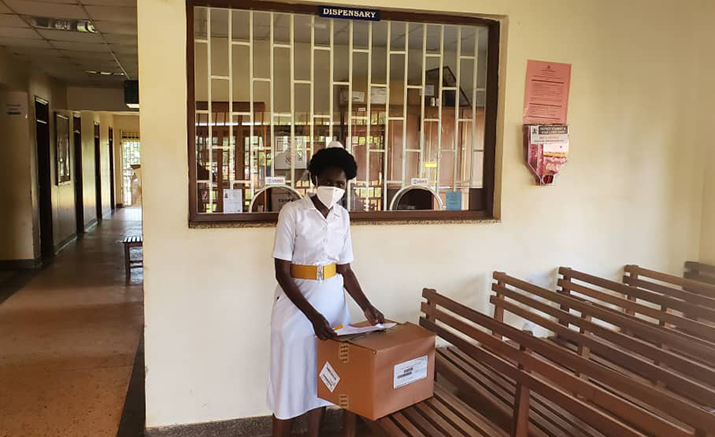Every Client Counts: Access to Real-time Stock Data Leads to Delivery of Lifesaving TB Medicines
Every Client Counts: Access to Real-time Stock Data Leads to Delivery of Lifesaving TB Medicines

Multidrug-resistant tuberculosis (MDR-TB) is a critical public health problem in Uganda, where the prevalence of MDR-TB in 2015 was an estimated 1.6% among newly diagnosed TB cases and 12% among previously treated TB cases.
Uninterrupted access to treatment is necessary to prevent a more serious form of MDR-TB, ensure that the treatment works, and help prevent drug resistance. However, the months-long treatment, plus side effects such as nausea and vomiting, causes some patients to abandon the regimen. Treatment gaps, low-quality drugs, and incorrect prescribing can also contribute to poor health outcomes and resistance.
Following a positive MDR-TB test, a patient at Jinja Regional Referral Hospital was prescribed a combination of medicines that included amikacin. However, the hospital did not have enough vials of amikacin on hand for the patient, and the next delivery wasn’t due to arrive for two weeks. The pharmacist contacted national medical stores with an emergency order, but no extra stock was available. Because the patient could not afford to purchase the drugs from a private facility, the only option was to identify a facility that could redistribute stock to Jinja hospital.
The USAID-funded Uganda Strengthening Supply Chain Systems (SSCS) Activity supports the Ministry of Health and partners in analyzing data and generating stock status reports from 369 facilities via a central pharmaceutical information portal. This platform provides insights into public- and private, not-for-profit-sector medicines supply chain performance, including stock availability. SSCS aims to have more than 1,000 high-volume facilities submitting stock status data to the pharmaceutical information portal by October 2021.
Using the stock status reports, SSCS helped identify the nearest health facilities with sufficient amikacin stock and connected Jinja to Lira Regional Referral Hospital. Other partners stepped in to help: The USAID/Defeat TB Activity worked with the RHITES-EC Activity to organize the documents and approvals needed to transfer the drugs from Lira to Jinja. The RHITES-North Lango supply chain department helped the Lira pharmacy team get authorization from the hospital director and the Lira district health officer.
The next challenge was to transport the drugs 400km from Lira to Jinja. Fortunately, the Ministry of Health Department of Pharmaceuticals and Natural Medicines team was conducting supportive supervision in Lira and agreed to deliver the drugs to Jinja on their way back to the Ministry.
Peter Niwagaba, Technical Advisor with USAID RHITES-EC, said, “Through coordination by the Supply Chain Management Advisor for RHITES-North Lango, the MDR drugs from Lira were delivered by Thomas Obua, Senior Pharmacist at Ministry of Health, saving time and costs. Ultimately, this ensured the availability of the drugs before the client’s next scheduled clinic visit.”
Even with just one client, the partners joined forces to leave no one behind in the fight to end TB. The availability of real-time stock data ensured that the patient did not have to interrupt treatment, despite the drug stock-out, which could have caused a more serious illness and threatened a cure.